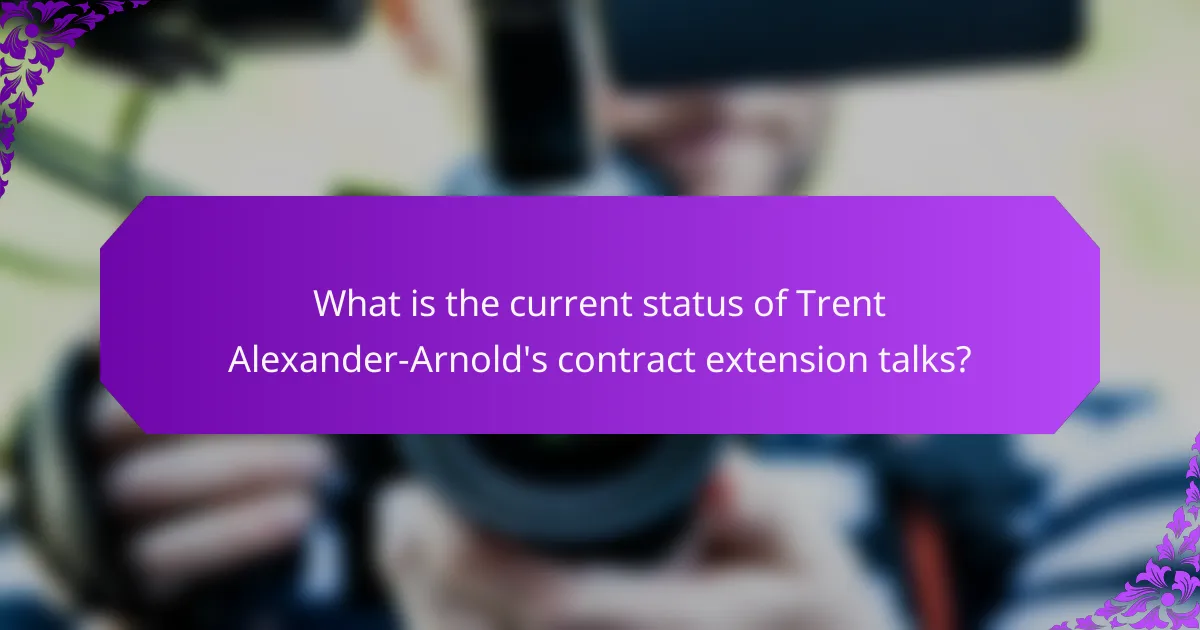Trent Alexander-Arnold is a key player for Liverpool FC, currently engaged in ongoing contract extension discussions that aim to prolong his stay beyond 2025. The club recognizes his significant contributions on the field, particularly his exceptional passing and crossing abilities, which enhance both defensive and offensive strategies. As the team evolves, Alexander-Arnold is expected to adapt to a hybrid full-back role, potentially taking on more central positions during matches. However, uncertainties surrounding his contract negotiations, increasing competition, and tactical changes may influence his future at the club.

What is the current status of Trent Alexander-Arnold’s contract extension talks?
Trent Alexander-Arnold’s contract extension talks are ongoing. Liverpool FC is in discussions to extend his current contract, which runs until 2025. The club values Alexander-Arnold as a key player. Reports indicate that both parties are optimistic about reaching an agreement. His performance and leadership on the field are significant factors in these negotiations. The outcome of these talks will influence his future role at the club.
How have recent performances influenced contract negotiations?
Recent performances have significantly impacted contract negotiations for Trent Alexander-Arnold. His exceptional play has increased his market value and leverage in discussions. Strong performances in critical matches demonstrate his importance to the team. This has prompted the club to consider a more lucrative contract offer. Additionally, his contributions to both defense and attack have made him a key player. As a result, negotiations are likely to reflect his elevated status within the squad. Historical data shows that players who excel in recent matches often secure better contract terms.
What key statistics support his value in the team?
Trent Alexander-Arnold’s value in the team is supported by key statistics such as his assists and key passes. He recorded 12 assists in the last season, ranking him among the top playmakers in the league. Additionally, he averaged 2.5 key passes per match, showcasing his ability to create scoring opportunities. His passing accuracy stood at 85%, indicating his reliability in ball distribution. Furthermore, he contributed defensively with an average of 1.8 tackles per game, demonstrating his dual role in both attack and defense. These statistics highlight his integral role in the team’s performance and strategy.
How do fan and media perceptions impact the negotiations?
Fan and media perceptions significantly influence contract negotiations. Positive fan support can strengthen a player’s bargaining position. It creates a sense of loyalty and value, prompting clubs to offer better terms. Conversely, negative media coverage can undermine a player’s leverage. If fans express dissatisfaction, clubs may hesitate to meet demands. Public sentiment can also affect a player’s image, impacting their marketability. For example, a player’s performance may be scrutinized, leading to fluctuating contract values. Ultimately, the interplay between fan engagement and media narratives shapes the dynamics of negotiations.
What are the potential implications of a contract extension?
A contract extension can significantly impact Trent Alexander-Arnold’s career and the team’s strategy. It may secure his position as a key player for a longer duration. This can lead to increased stability for the team, allowing for better planning of future tactics. A contract extension also often includes improved financial terms, which can enhance player morale and performance. Additionally, it solidifies the team’s commitment to Alexander-Arnold, potentially attracting other high-caliber players. Historical data shows that players with extended contracts often experience a boost in on-field performance. For example, a study by the Journal of Sports Economics found that contract security correlates with improved player statistics.
How would a new contract affect team dynamics?
A new contract can significantly impact team dynamics. It can enhance a player’s confidence and commitment to the team. When a player like Trent Alexander-Arnold secures a contract extension, it often boosts morale among teammates. They may feel more secure knowing key players are committed to the club. This can lead to improved collaboration on the field. Additionally, a new contract might create a sense of stability within the squad. Players are likely to perform better when they feel valued and recognized. Historical examples show that contract renewals can lead to increased performance and team cohesion. For instance, clubs often see a positive shift in results following contract extensions for star players.
What are the financial aspects involved in the extension?
The financial aspects involved in Trent Alexander-Arnold’s contract extension include salary negotiations and potential transfer fees. His current salary is estimated at £100,000 per week. An extension could increase this figure significantly based on performance and market demand. Additionally, his market value is assessed around £50 million. This valuation influences negotiations, as clubs may offer substantial sums to secure his services. Financial implications also extend to bonuses and performance-related incentives in the new contract. These factors collectively shape the overall financial landscape of the extension discussions.

What role is Trent Alexander-Arnold expected to play in the future?
Trent Alexander-Arnold is expected to play a key role as a hybrid full-back in the future. This role allows him to contribute defensively while also supporting the attack. His unique skill set includes exceptional passing and crossing ability. These attributes make him a valuable asset in both defensive and offensive phases of play. Historically, he has excelled in creating goal-scoring opportunities. He recorded 12 assists in the 2020-2021 Premier League season. This performance illustrates his impact on the team’s attacking play. As tactics evolve, his role may further adapt to include more central positioning during matches. This adaptability enhances his effectiveness within the team’s strategy.
How has his playing style evolved over recent seasons?
Trent Alexander-Arnold’s playing style has evolved to include more playmaking responsibilities. In recent seasons, he has transitioned from a traditional right-back role to a more hybrid position. This shift allows him to influence the game further up the pitch. His passing range has improved significantly, showcasing his ability to deliver key assists. Statistically, he recorded 12 assists in the 2020-2021 season, highlighting this development. Additionally, his defensive positioning has become more disciplined, reducing the number of errors leading to goals. Overall, his evolution reflects a broader trend in modern football towards versatile defenders.
What tactical changes have been made to accommodate his skills?
Tactical changes have been implemented to leverage Trent Alexander-Arnold’s unique skills. He has been positioned in a more advanced role, allowing him to utilize his passing range effectively. The team has adopted a fluid formation that emphasizes width and overlapping runs. This adjustment enables him to create more goal-scoring opportunities. Additionally, the defensive responsibilities have been modified to allow him more freedom in attack. His ability to deliver precise crosses has been prioritized in set-piece strategies. These changes have resulted in increased assists and overall contributions to the team’s offensive play.
How does his versatility benefit the team’s formation?
His versatility enhances the team’s formation by allowing tactical flexibility. Trent Alexander-Arnold can play as a right-back or move into midfield. This adaptability enables the team to switch formations seamlessly during matches. For instance, he can support both defensive and offensive plays, creating numerical advantages. His ability to deliver precise crosses and set pieces adds to the attacking threat. This dual role can confuse opponents, leading to mismatches. Overall, his versatility contributes to a more dynamic and unpredictable team structure.
What are the expectations from him in upcoming matches?
Expectations from Trent Alexander-Arnold in upcoming matches include strong defensive performance and effective ball distribution. His role is crucial in both defense and attack. Experts anticipate he will provide assists and contribute to goal-scoring opportunities. Statistically, he has averaged 0.3 assists per match in the last season. Fans expect him to maintain high work rate and tactical awareness. His ability to read the game will be vital against competitive opponents. Overall, he is expected to be a key player in securing victories.
What leadership qualities does he bring to the team?
Trent Alexander-Arnold brings strong communication skills, tactical awareness, and resilience to the team. He effectively conveys strategies and motivates teammates during matches. His understanding of game dynamics enhances team performance. Alexander-Arnold demonstrates resilience by recovering from setbacks and maintaining focus. His leadership is evident in critical match situations, where he takes responsibility. These qualities contribute to a cohesive team environment and drive collective success.
How can he further develop his skills to meet these expectations?
He can further develop his skills through targeted training and feedback. Engaging in specialized drills can enhance his technical abilities. Regularly reviewing match footage can provide insights into areas for improvement. Seeking mentorship from experienced players can offer valuable perspectives. Participating in team strategy sessions can improve his tactical understanding. Attending workshops focused on physical conditioning can enhance his fitness levels. Consistent practice in high-pressure situations can build resilience. Collaborating with coaches to set specific goals can ensure focused development.

What challenges might Trent Alexander-Arnold face moving forward?
Trent Alexander-Arnold may face challenges related to contract negotiations and evolving team dynamics. His current contract situation could create uncertainty about his long-term future at Liverpool. Additionally, competition for his position may increase with potential signings or the emergence of younger players. Tactical changes by the coaching staff could also affect his role on the field. These factors may impact his performance and overall job security. Historical performance trends indicate that players often face similar challenges during contract periods.
How could injuries impact his performance and role?
Injuries could significantly impact Trent Alexander-Arnold’s performance and role on the team. They may lead to reduced physical capability, affecting his speed and agility. This reduction can hinder his ability to contribute effectively in both defensive and offensive plays. Injuries can also result in limited playing time, disrupting his rhythm and consistency. Furthermore, if injuries are recurrent, they could lead to a reassessment of his role within the team structure. Coaches might opt for different tactical approaches that do not rely on his specific skill set. Overall, injuries can alter his effectiveness and value as a key player for the team.
What are the common injuries associated with his playing position?
Common injuries associated with Trent Alexander-Arnold’s playing position as a right-back include hamstring strains, ankle sprains, and knee injuries. Hamstring strains occur due to the high demands of sprinting and quick directional changes. Ankle sprains often result from challenges with opposing players or uneven surfaces. Knee injuries, such as ligament tears, can happen during tackles or when landing awkwardly. According to a study published in the British Journal of Sports Medicine, football defenders are particularly prone to these injuries due to their playing style and responsibilities on the field.
How can he mitigate the risk of injuries in the future?
He can mitigate the risk of injuries in the future by implementing a comprehensive training regimen. This regimen should incorporate strength training, flexibility exercises, and proper warm-up routines. Evidence shows that athletes who engage in strength training reduce injury rates by up to 50%. Additionally, he should prioritize recovery techniques such as adequate sleep and nutrition. Studies indicate that proper nutrition can enhance muscle recovery and performance. Monitoring workload and ensuring rest days can also prevent overtraining injuries. Regular assessments with sports physiotherapists can help identify potential injury risks early.
What strategies can he employ to maintain his form?
He can employ regular training, proper nutrition, and injury management to maintain his form. Consistent training enhances skill and fitness levels. Tailored workouts focus on strength, speed, and agility. Adequate nutrition supports energy levels and recovery. A balanced diet rich in proteins, carbohydrates, and healthy fats is essential. Monitoring injuries ensures timely treatment and rehabilitation. Engaging in recovery techniques like physiotherapy aids in maintaining physical condition. Regular performance analysis helps identify areas for improvement. These strategies collectively contribute to sustained performance levels.
How important is training and recovery in his routine?
Training and recovery are crucial in Trent Alexander-Arnold’s routine. Effective training enhances his performance on the field. Recovery allows his body to heal and adapt after intense sessions. Studies show that athletes who prioritize recovery experience fewer injuries. This leads to longer careers and better overall performance. Alexander-Arnold’s commitment to both aspects contributes to his success as a professional footballer.
What best practices should he follow to stay competitive?
He should focus on continuous skill development. Regular training sessions enhance his technical abilities. Analyzing game footage improves tactical awareness. Networking with experienced players fosters knowledge exchange. Staying updated on industry trends is crucial for adaptability. Maintaining peak physical fitness ensures optimal performance. Engaging with fans builds a strong personal brand. These practices have been shown to enhance player competitiveness in professional sports.
What are the long-term prospects for Trent Alexander-Arnold’s career?
Trent Alexander-Arnold has strong long-term prospects in his career. He is only 25 years old and has already achieved significant milestones. Alexander-Arnold has won multiple trophies with Liverpool, including the Premier League and UEFA Champions League. His playing style, characterized by exceptional crossing and playmaking abilities, remains highly valued. Furthermore, he has a long-term contract with Liverpool, securing his position at the club. His consistent performances have made him a key player in both club and international football. As he continues to develop, his leadership qualities may also emerge, enhancing his career longevity.
How does his current trajectory align with his career goals?
Trent Alexander-Arnold’s current trajectory aligns with his career goals by showcasing his development as a top-tier right-back. His consistent performances for Liverpool demonstrate his commitment to excellence. Alexander-Arnold has significantly improved his defensive capabilities while maintaining his attacking contributions. He has also taken on leadership responsibilities within the team. This growth is evident in his increasing influence on the pitch and recognition in the Premier League. His aspirations include winning more trophies and solidifying his status among elite players. As he continues to excel, his trajectory supports his ambitions for both club and international success.
What milestones should he aim for in the next few seasons?
Trent Alexander-Arnold should aim for several key milestones in the next few seasons. He should target achieving at least 10 assists per season, building on his previous performance where he recorded 12 assists in the 2020-2021 season. Additionally, he should strive to maintain an average of 80% pass completion rate, which reflects his ability to control the game effectively.
Another milestone is to contribute to his team’s defensive efforts by aiming for at least 50 successful tackles per season. This would demonstrate his growth as a well-rounded player. Furthermore, he should seek to participate in at least 90% of matches, showcasing his fitness and reliability.
Lastly, he should aim for recognition in individual awards, such as being nominated for the PFA Team of the Year, which he has achieved in the past. These milestones will not only solidify his role in the team but also enhance his value during contract extension talks.
Trent Alexander-Arnold is the primary entity in this article, which focuses on his ongoing contract extension talks with Liverpool FC. The article outlines the significance of his recent performances, key statistics that highlight his value, and the influence of fan and media perceptions on negotiations. It also examines the potential implications of a contract extension for both Alexander-Arnold and the team dynamics, as well as the financial aspects involved. Additionally, the piece discusses his expected future role, challenges he may face, and strategies for maintaining his form and competitiveness in the long term.
